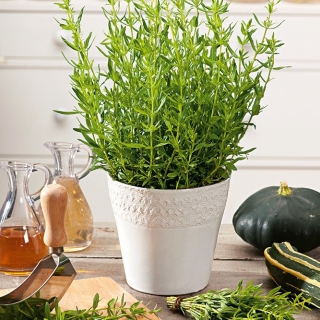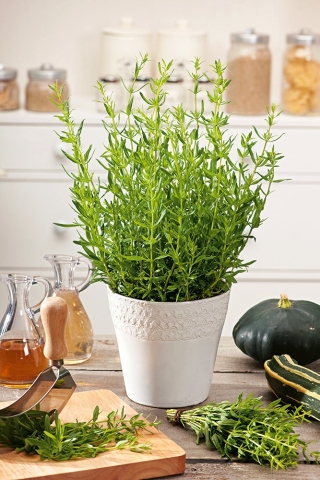Hyssop (Hyssopus officinalis) is a perennial from the mint family. It comes from Central Asia and the Mediterranean. Now it also grows in the wild in central and northern Europe. It is rather rarely cultivated in gardens. You can use it for medicinal and spice purposes, but it is also a melliferous plant that bees love to feed on.
Hyssop is a branched semi-shrub that grows 30 to 60 cm tall. It develops dense, erect, woody shoots at the base and lush foliage of lanceolate leaves. There are speckled glands that contain essential oils at both sides of the leaf blade. The smell of hyssop is strong, somewhat reminiscent of camphor. Bilabial flowers gathered in pseudo-umbels grow on the top shoots of the plant. Their protruding, usually dark purple stamens are very rich in nectar. The whole plant is covered with delicate hairs.
Hyssop is a species that awaits a sunny, warm place. It prefers light, dry, quickly warming, permeable, and calciferous soils. It does not tolerate heavy, acidic and moist soils. It cannot stand shade either. Hyssop plants are quite resistant to low temperatures but can be damaged by frost in colder regions. To avoid this, we recommend providing them with a cover of twigs or mulch. Growing hyssop is very easy, the plant does not require special care, fertilization, or irrigation. If you care about the decorative qualities of hyssop, remove its faded flowers to maintain an attractive plant habit.
Hyssop blooms in the middle of summer, from mid-July to the end of August. This distinctly fragrant plant attracts many insects that feed on nectar and pollen. That is why we recommend hyssop to all who support small, useful pollinating creatures. The honey yield of hyssop is about 200-400 kg per 1 ha of use.
Hyssop seeds can be sown directly into the ground in April or cultivated from seedlings sown in March onto a hotbed. Hyssop germinates about 15 days after sowing. The early development of plants is slow. At the target site, arrange seedlings in rows every 30 centimetres, keeping plants 40 centimetres apart.
Not only bees can take advantage of hyssop. It is a great choice for perennial beds and planting single. Its attractive habit and eye-pleasing flower colour belong to main advantages of this plant. Hyssop, rich in essential oils, constitutes a valuable herbal raw material both for the cosmetics industry and seasoning of meat and vegetable dishes.
One package contains 100 grams of seeds of the melliferous hyssop. Basic plant information and growing instructions were printed on the package.
- Height: 30 to 60 cm
- Use: herb; melliferous
- Blooming time: July to August
- Growth form: semi-shrub
- Flower colour: purple
- Vegetation form: perennial
- Foliage: lanceolate, green
- Flower type: bilabial,
- Site: sunny; light, dry, quickly warming, permeable, calciferous soil
- Weight: 100 g
GardenSeedsMarket - has been in business for more than a decade and from the very beginning we have made the quality of our products the top priority. Throughout the years we have delivered the best quality goods to tens of thousands of customers from all over the world. Their satisfaction proves that we had chosen the right way.
All seeds we sell are subject to a multi-level quality control checks and only then are carefully packed and dispatched. Our products have been awarded numerous certificates and comply with the highest standards of the European Union. Our employees are experienced gardeners who are more than happy to answer your every question.
Where do our seeds come from?
All of the seeds sold in our shop come from the best producers from across the European Union. Thanks to a long-standing cooperation with them we were able to develop the most adequate storing and dispatch conditions, guaranteeing that you always receive fresh and carefully tested batches of seeds. Exclusion of the middlemen from the whole process not only makes it possible for us to avoid sending out-of-date seeds that might have been lying too long on a warehouse shelf, but also ensures the most attractive price for top quality products.
The quality control process
All our seeds must pass a four-stage quality control process.
Stage one begins with a careful selection of the suppliers. Than we proceed with controlling their crops, foreign producers are not excluded from the quality control process. Plants are checked at every stage of their development: when they start to grow, during blooming and when they start bearing fruit (seeds). At this stage the most important thing is to ensure proper spacing of the plants. Thanks to that obtaining the desired morphological characteristics of each particular species or variety, such as colour, height and shape, can be ensured.
Stage two consists of a detailed verification tests in laboratory conditions. With the use of the highest quality equipment by the highly qualified staff, our suppliers perform more than 30 000 quality checks annually. The seeds that do not meet our requirements are subject to technological refining processes, including drying, cleaning, upgrading and testing again.
Stage three starts with sowing seeds in selected control plots. That way we obtain valuable, exact information concerning their germination that must be maintained at an appropriate level. Simultaneously, the varietal identity of each species is checked at this stage.
Stage four takes place in our warehouses and consists of eliminating seeds that have been stored for too long on our shelves and replacing them with new batches. Each package is stamped with a unique batch number and also with the sow-by-date.
All four stages combined allow us to state with confidence that the seeds we deliver comply with the highest standards and have completed all required control stages with flying colours.
Prizes and awards
The seeds we sell are widely recognized for their quality and have won many awards. Our seeds won numerous gold medals and distinctions for their high quality. The World of Flowers was also honoured for its innovative approach.
Among those awards there were: TOP INNOVATION (June 2015), GOLD MEDAL AT THE POZNAN INTERNATIONAL FAIR (2015), CONSUMER QUALITY LEADER (2014), FARMER OF THE YEAR (2014).
In addition, we have also been awarded the “IDEAL BUSINESS” certificate for two years in a row.
Germination
We are committed to selling only the highest quality seeds. Taking into consideration the efforts we make daily, please also note that plants are living organisms and their germination and growth depends on many factors, such as temperature, soil type, humidity and the frequency with that they are watered, sowing time and conditions, use of fertilizers and plant protection agents (pesticides), as well as weather and climate conditions. We provide help by sharing the accurate and up-to-date sowing and growing information, however, we cannot bear any responsibility for the plants that were not cultivated in conditions appropriate for given species.







